Music Therapy, Music Medicine, or Spotify: Coping with Anxiety and Pain
Coping with anxiety and pain management in surgery or other procedures
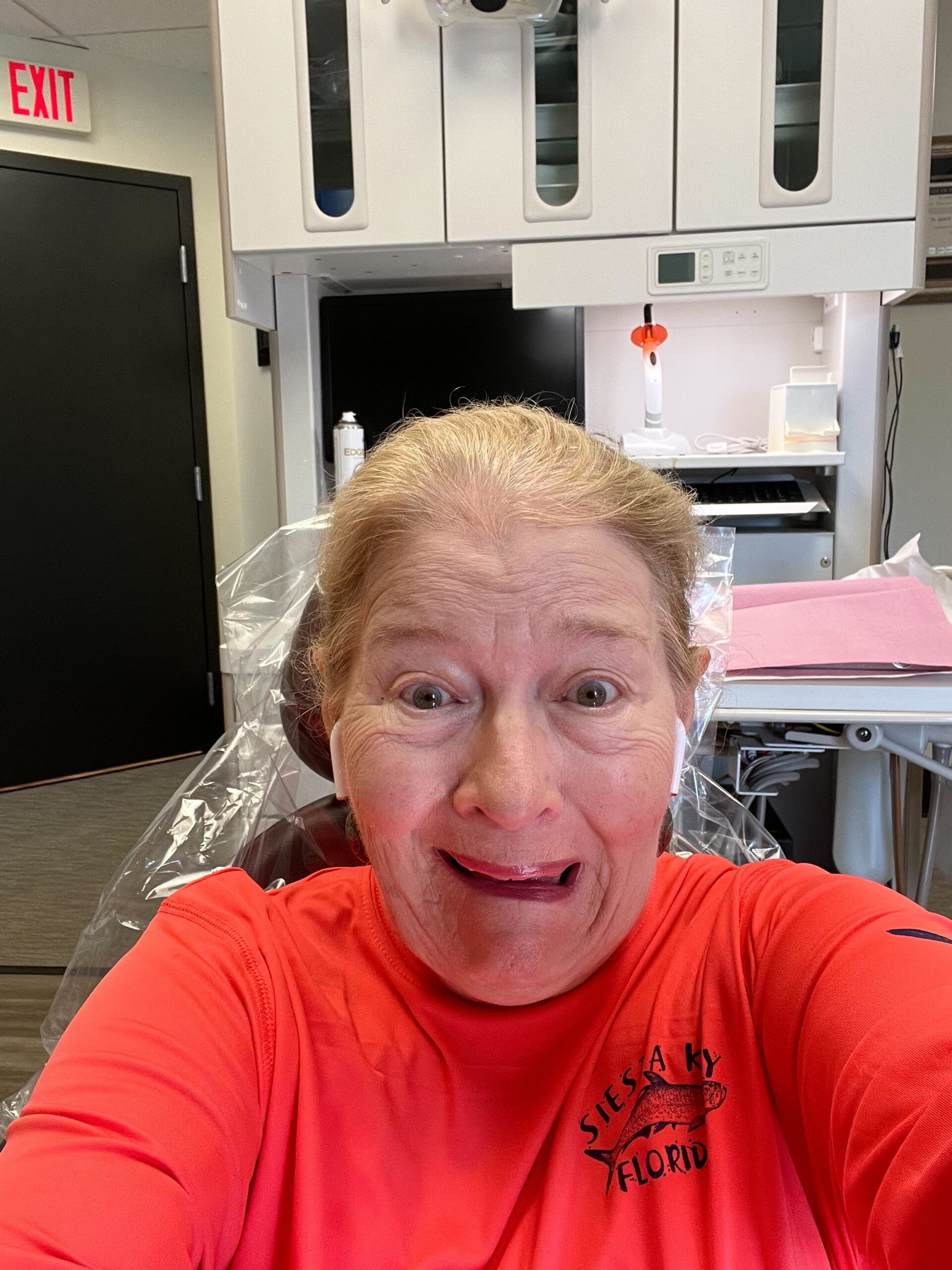 You’re having surgery, or a painful, scary, medical/dental procedure! What should you use if you’ve heard about how music can improve your experience and even your results? The clinical research grows by the day and the result are clear. Using music chosen by the patient makes a huge difference.
You’re having surgery, or a painful, scary, medical/dental procedure! What should you use if you’ve heard about how music can improve your experience and even your results? The clinical research grows by the day and the result are clear. Using music chosen by the patient makes a huge difference.
But there is a lot of confusion out there about the difference between Music Therapy and Music Medicine and even Spotify for surgical/medical procedures. Because most people do not know that difference, I thought I would lay it our for you as clearly and succinctly as possible. It’s really not that complicated. Here’s a breakdown of the differences:
What exactly is Music Therapy?
According to musictherapy.org, music therapy is a professional practice that uses music interventions to achieve individualized goals within a therapeutic relationship. In other words, music therapy is only conducted one on one with a licensed music therapist. NO ONE else can do music therapy in a hospital or anywhere else. If a professional musician or a very good amateur musician plays music for patients in any way, it may actually be therapeutic, but you cannot call it music therapy.
Conducting a music therapy session takes time and some knowledge of the patient and why they are there. This takes specific training. Most hospitals do not have time or resources to have music therapists giving tailored sessions to hundreds of patients a day. Many music therapists work in Rehab settings, or on an Oncology Unit. Sometimes music therapists do group sessions with patients who all have the same or similar diagnoses.
A licensed professional music therapist will first get to know you and establish a therapeutic relationship. Then together they create a music intervention with you that has specific, measurable goals in mind. Music therapy deals with many populations, but surgery, typically, is not one. Most hospitals have no more than 3 music therapists.
Unfortunately, many of the research studies that are published say that the patient was given music therapy when they were actually given recorded music. This is something that I am attempting to clarify among professional health care workers.
What exactly is Music Medicine?
 Music medicine is often defined as listening to music during medical procedures for a relaxing effect. The advantage over music therapy is that it doesn’t require a trained music therapist so it’s less expensive. It can also be used in more diverse situations where a music therapist wouldn’t be allowed, such as surgery.
Music medicine is often defined as listening to music during medical procedures for a relaxing effect. The advantage over music therapy is that it doesn’t require a trained music therapist so it’s less expensive. It can also be used in more diverse situations where a music therapist wouldn’t be allowed, such as surgery.
Our Music Medicine system is unique because it has been curated by a clinical musicologist who is also a licensed clinical social worker. It has been used around the world in hospitals and clinics. Surgeons and anesthesiologists have recommended our music for joint replacements, aneurysms, cancer surgeries and heart by-passes.
Patients have also chosen it for Ceasarian sections, colonoscopies, cataract surgery and dental work. Because the music has been curated by a professional clinical musician, and the patient will be under anesthesia, a music therapist is not
Because patient-selected music has been shown to have the best effect, the therapeutic playlists are offered in 5 different genres. Surgical Serenity Solutions (” the patient can select from ) offers playlists in Classical, Jazz, New Age, Lullabies, and Memory Care. Most patients choose classical or jazz. We recommend that the hospital stock MP3 players or preloaded headphones in all 5 genres and let the patient choose their preferred genre and the pre-surgery visit
It can be ordered or suggested by the surgeon, the anesthesiologist, the nurse, the chaplain, or any clinical professional. This Music Medicine intervention is pre-recorded music that has been specifically curated for a medical need, like surgery, or even specifically for a patient, but not administered in a one on one situation. This therapeutic music can be used, ALWAYS through headphones or earbuds, in just the pre-op area, just during the procedure, or just in the recovery area. We recommend that it be used throughout the perioperative period for maximum positive results. To purchase the headphones or MP3 players, click this link: www.surgicalserenitysolutions.com/hospitalheadphones.
Where does Spotify fit in?
Which finally brings us to Spotify! Spotify says very clearly on its website that it’s not for commercial use but many surgeons have told me that they “just use Spotify” and when I mention that a commercial license is required they say they had no idea!
I have been offered calming music when I have an MRI They usually ask what kind of music I’d like to hear in the MRI machine and I respond that I’d like to hear Chopin or Brahms. Maybe some Rachmaninoff, Debussy or Ravel. Then I ask the souce of their music and they laugh and it’s just my own personal Spotify account! When I inform them that it’s illegal to use a personal account they exclaim that they had no idea but continue to load the Spotify! It’s a little mind-boggling to me. https://support.spotify.com/us/article/spotify-public-commercial-use/
Spotify definitely has it’s place, but Spotify is intended for entertainment, not a medical procedure. The pain, anxiety and risk management requirements that enter into a surgical/medical procedure, require carefully thought-out and curated playlists.
Spotify states clearly that it’s not for medical use but hospitals truly don’t seem to be aware of this and Spotify doesn’t seem to enforce its license requirement,
In Conclusion

Two surgeons preparing for surgery
For surgical procedures, before, during and after, Music Medicine is clearly the only viable choice. Surgical Serenity Solutions is the only company offering therapeutic playlists in five different genres that the patient can choose from, delivered in pre-loaded headphones or MP3 players.
Music therapists do not go into surgical procedures and Spotify is not therapeutic music that will entrain your heartbeat and breathing. During surgery, your body responds to the steady pulse of our instrumental playlists and keeps your body rhythms stabilized. When you body is relaxed by music coming directly into your brain through the 8th cranial nerve, you require less anxiety meds, less anesthesia and less pain medication. This also allows you to recover faster and get back to your life!
Our headphones are available to both patients and in bulk for hospitals. The MP3 players are just for hospitals so that they can be branded and given to patients to take home after their procedure!
Again, to purchase the Surgical Serenity Solutions, go to www.surgicalserenitysolutions.com/mp3players
Let me know if I can help you in any way! www.surgicalserenitysolutions.com/contact-us


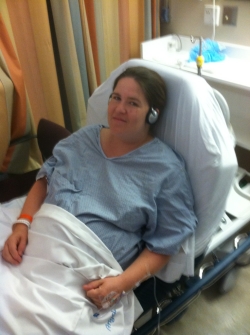 Mayo Clinic in Rochester, MN was my first hospital to use the headphones in their post-cardiac unit and they reported great results! Nurses reported that the patients loved the music and their vital signs stabilized faster and they required less anxiety and pain medication.
Mayo Clinic in Rochester, MN was my first hospital to use the headphones in their post-cardiac unit and they reported great results! Nurses reported that the patients loved the music and their vital signs stabilized faster and they required less anxiety and pain medication.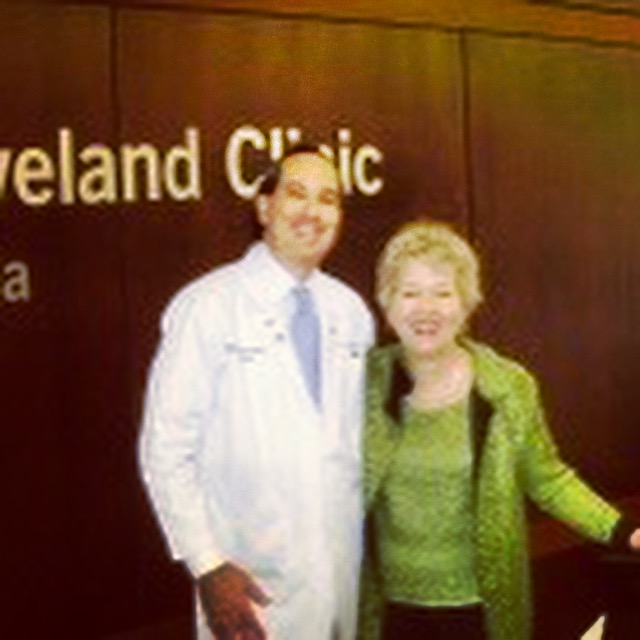 The next big hospital that tried my headphones was Cleveland Clinic Florida, on recommendation from the main Cleveland Clinic in Cleveland. I was even invited down to give a Grand Rounds presentation to surgeons and anesthesiologists.
The next big hospital that tried my headphones was Cleveland Clinic Florida, on recommendation from the main Cleveland Clinic in Cleveland. I was even invited down to give a Grand Rounds presentation to surgeons and anesthesiologists.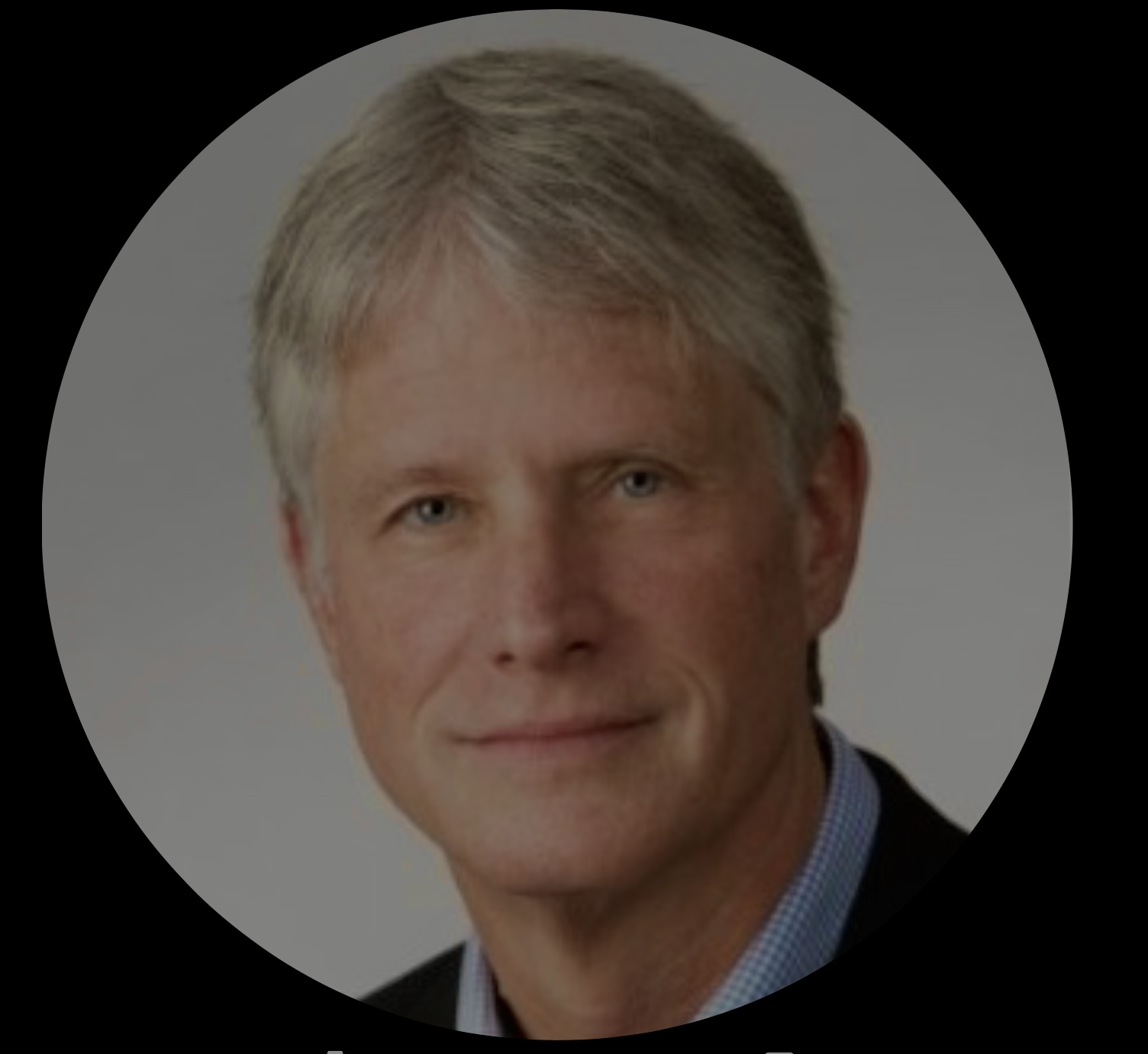 In about 2013 I became acquainter with Dr. Michael Peck, anesthesiologist at Johns Hopkins in Maryland. Dr. Peck was a strong advocate from the beginning and gave me so many wonderful ideas as well as purchasing a “Cloud Kit” product for their surgery department.
In about 2013 I became acquainter with Dr. Michael Peck, anesthesiologist at Johns Hopkins in Maryland. Dr. Peck was a strong advocate from the beginning and gave me so many wonderful ideas as well as purchasing a “Cloud Kit” product for their surgery department.
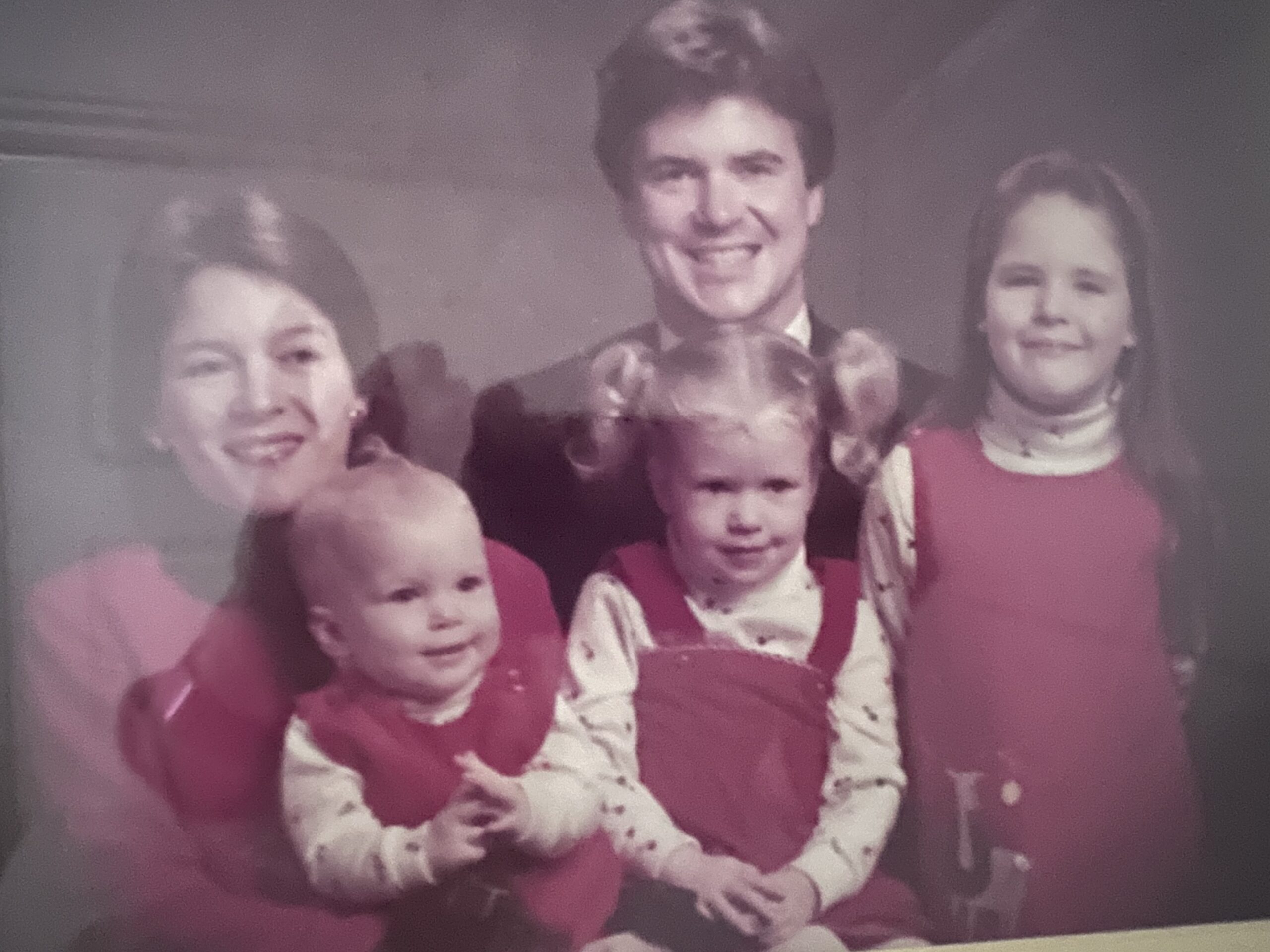 When I gave birth three times, I knew that I wanted music to be a part of that experience and that I did NOT want any more medication that I absolutely needed. For that reason, my husband and I took the LaMaze childbirth classes and the last time, the Bradley childbirth classes. I also knew that having soothing and calming music would make it a better experience for everyone and my doctor and nurses were fine with that.
When I gave birth three times, I knew that I wanted music to be a part of that experience and that I did NOT want any more medication that I absolutely needed. For that reason, my husband and I took the LaMaze childbirth classes and the last time, the Bradley childbirth classes. I also knew that having soothing and calming music would make it a better experience for everyone and my doctor and nurses were fine with that.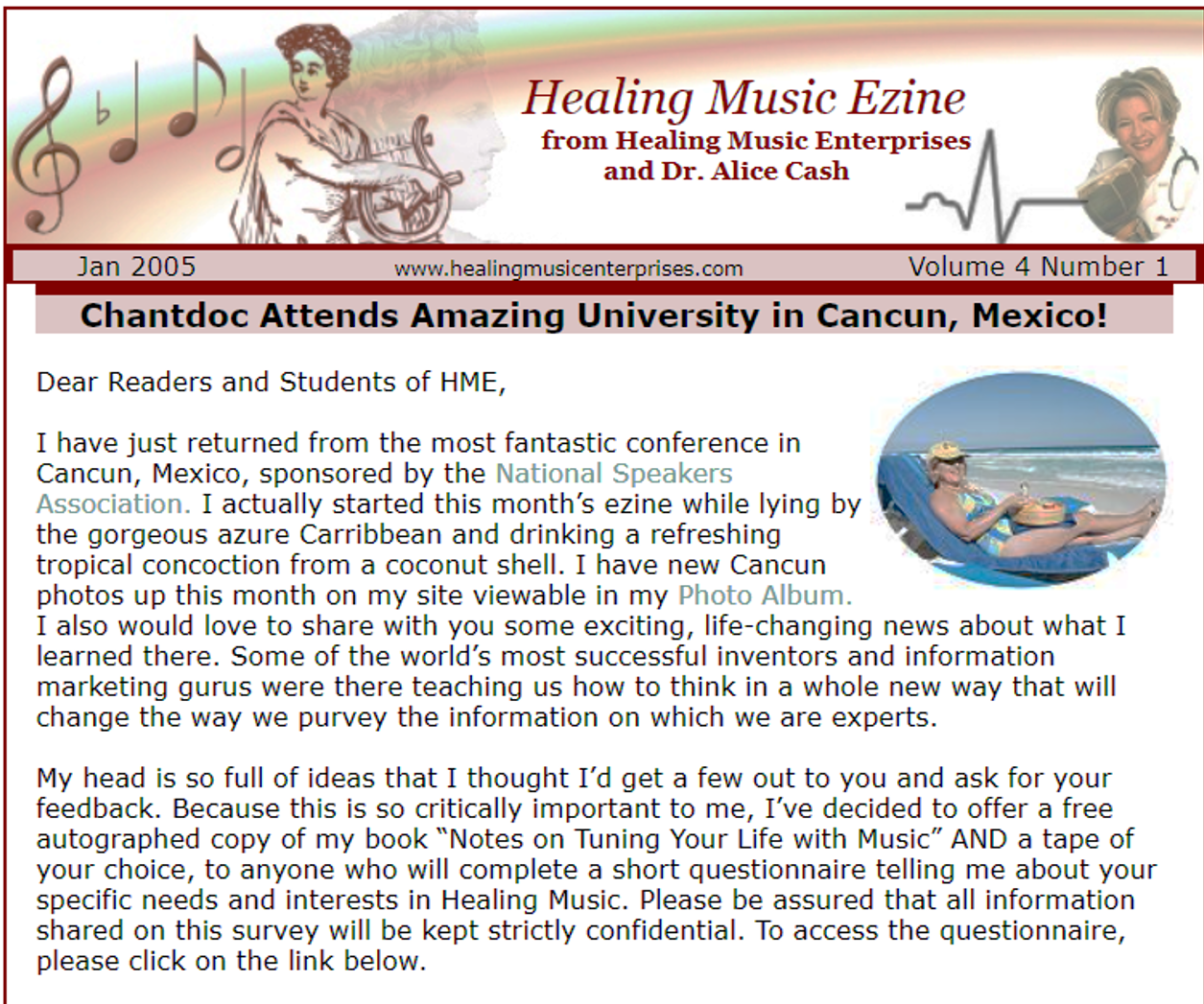 Jump to 2005, I attended a conference in Cancun, Mexico created for professional speakers. It was called “Cancun University” and offered 4 learning tracks to improve our businesses. One of the tracks was called “Product Innovation” and the other was called “Internet Marketing.” The very first day of the product innovation class I had the idea to create preloaded headphones for surgery patients. And within months I had filed for the provisional patent and had created a website with a monthly ezine as well as a blog. For a long time I blogged every single day!
Jump to 2005, I attended a conference in Cancun, Mexico created for professional speakers. It was called “Cancun University” and offered 4 learning tracks to improve our businesses. One of the tracks was called “Product Innovation” and the other was called “Internet Marketing.” The very first day of the product innovation class I had the idea to create preloaded headphones for surgery patients. And within months I had filed for the provisional patent and had created a website with a monthly ezine as well as a blog. For a long time I blogged every single day! Our protocol involves giving the patient their preloaded headphones or MP3 player, in the genre of their choice, as soon as they enter the pre-op area. As they are getting their gown on and perhaps an IV, they are listening to our Surgical Serenity music and their vital signs are calming and moving toward homeostasis.
Our protocol involves giving the patient their preloaded headphones or MP3 player, in the genre of their choice, as soon as they enter the pre-op area. As they are getting their gown on and perhaps an IV, they are listening to our Surgical Serenity music and their vital signs are calming and moving toward homeostasis. I just returned last evening from the Van Cliburn International Piano Competition and WOW, what an amazing experience of a lifetime that was!
I just returned last evening from the Van Cliburn International Piano Competition and WOW, what an amazing experience of a lifetime that was!
 Music like this is totally engrossing and a joy to listen to.
Music like this is totally engrossing and a joy to listen to.
 All of this changed when I was hired by the University of Louisville School of Medicine to do research into Music Medicine and the healing power of music. Within months I began getting invitations to speak to local medical and lay organizations and almost from the beginning, I LOVED it! (Yes, at first I was nervous because I thought I had to memorize a speech, but later I found out that I could speak from an outline and that literally changed everything!) I guess I’m a storyteller and when I think back to my earliest memories and experiences with music–from my father singing to me as a baby, being in the church nursery and singing songs, to hearing a piano for the first time and finally beginning lessons at age 8–the stories begin to flow!
All of this changed when I was hired by the University of Louisville School of Medicine to do research into Music Medicine and the healing power of music. Within months I began getting invitations to speak to local medical and lay organizations and almost from the beginning, I LOVED it! (Yes, at first I was nervous because I thought I had to memorize a speech, but later I found out that I could speak from an outline and that literally changed everything!) I guess I’m a storyteller and when I think back to my earliest memories and experiences with music–from my father singing to me as a baby, being in the church nursery and singing songs, to hearing a piano for the first time and finally beginning lessons at age 8–the stories begin to flow! NOW, in the era of podcasts I have been getting invitations from all kinds of interesting people to talk about how music helps in surgery and in other areas of the hospital. When I am interviewed by a podcaster I realize that I really don’t even need any notes because all of this information is stored in my brain. There is almost nothing I’d rather do than talk about the healing power of music and I’ve now done it around the world, including western Europe, South Korea, Hawaii, and Canada!
NOW, in the era of podcasts I have been getting invitations from all kinds of interesting people to talk about how music helps in surgery and in other areas of the hospital. When I am interviewed by a podcaster I realize that I really don’t even need any notes because all of this information is stored in my brain. There is almost nothing I’d rather do than talk about the healing power of music and I’ve now done it around the world, including western Europe, South Korea, Hawaii, and Canada! Most of the podcasters either send me a list of questions that they want me to answer or they ask me to send them a list of questions that I think would be interesting to their audience. I love their questions and eagerly answer them and then expand on them. All but one of these podcasts has been video and audio but one of them was audio only. I prefer having video too because I believe I get lots of information from people when I’m watching them talk, like body language and facial expressions. Maybe that’s because I am also now a psychotherapist and I do this every day.
Most of the podcasters either send me a list of questions that they want me to answer or they ask me to send them a list of questions that I think would be interesting to their audience. I love their questions and eagerly answer them and then expand on them. All but one of these podcasts has been video and audio but one of them was audio only. I prefer having video too because I believe I get lots of information from people when I’m watching them talk, like body language and facial expressions. Maybe that’s because I am also now a psychotherapist and I do this every day.
 I’m not sure that the average person who is waiting for surgery knows that there are medical apps that can reduce anxiety and pain perception. My Surgical Serenity Solutions app has been in both the Apple App Store and the Google Play Store for awhile now and it is free to download, listen to the samples, and then choose your preferred playlist for $9.99, a one-time payment.
I’m not sure that the average person who is waiting for surgery knows that there are medical apps that can reduce anxiety and pain perception. My Surgical Serenity Solutions app has been in both the Apple App Store and the Google Play Store for awhile now and it is free to download, listen to the samples, and then choose your preferred playlist for $9.99, a one-time payment.